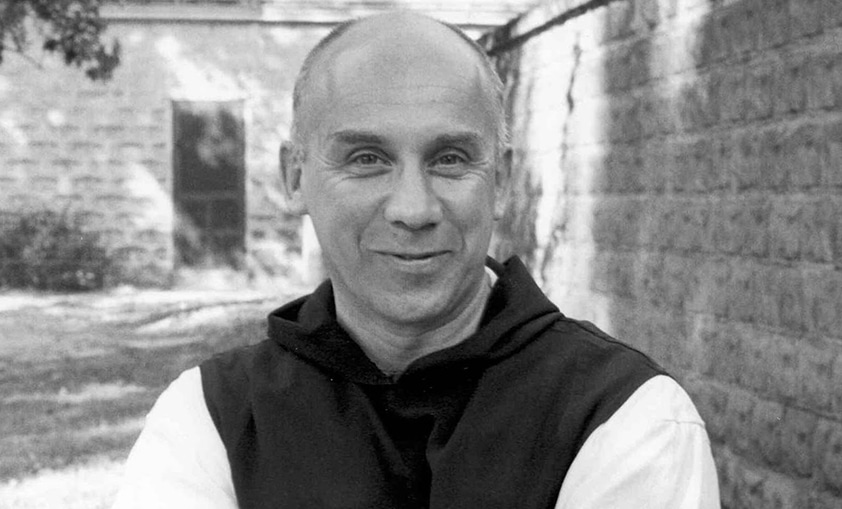Thomas Merton was a Trappist monk and prolific writer who lived in the early to mid-20th century. He was not a saint, nor is he likely to become one, as he had some confusing tendencies toward eastern religions later in his life that at least outwardly appear to be a bit off the saintly path.
But much of his early life, his writings, and a particular prayer of his have quite a bit of relevance to our lives as modern Catholics and as singles.
An Early Life Lacking Direction

Thomas Merton was born in 1915 to an Anglican father and a Quaker mother in France. He was baptized in the Church of England, but religion was not a big part of his early upbringing.
When he was only six years old, his mother died. A mere year later, his father began a relationship with another woman, which upset young Thomas. By age eleven, his father had put him in a boarding school, and Thomas was very lonely.
Throughout his adolescence at various preparatory schools, Thomas became thoroughly agnostic, deciding that he believed in nothing. In fact, even when he developed a case of severe blood poisoning from an infection under his toenail, the possibility of death didn’t even serve to bring thoughts of God to his mind at all.
A trip to Rome, however, did begin to draw him toward Catholicism. He was eighteen at the time, and the beauty of the basilicas and churches began to open his heart to God… But then he entered college and began a hedonistic lifestyle. Though maybe not for as long in duration, his hedonism was definitely of a similar character to St. Augustine’s early life and included things like excessive drinking and womanizing.
And yet despite this, Thomas Merton was to leave it all behind in a deep conversion and an answer to a call to religious life.
A Conversion, Followed by More Floundering

Thomas Merton’s conversion was a gradual affair, not some fantastic or earth-shattering event. Rather, during his time at Columbia University in New York, he read various philosophical and spiritual books seemingly by chance, with no intention of converting. But they opened his mind and his heart further to Catholicism until he finally gave in to the nudge of conversion.
It wasn’t long before he knew he was called to something even deeper. He explored diocesan priesthood, the Jesuits, the Cistercians, and settled briefly on becoming a Franciscan Friar before it became clear that the order was not for him after all when they rejected him.
The time following this rejection was hard for him, as his plans needed some radical shifting. Instead of entering the novitiate, he now needed a job.
He ended up with an English professor position at St. Bonaventure University, and he grew deeply in his spiritual life during his time there. All of this prepared him for a vocation as a Trappist at the Abbey of Gethsemani in Kentucky.
His Legacy of Writings and Prayers

Eventually, he did find this vocation of his, but it definitely took him a while to arrive there.
So for all of us, as we flounder along in an attempt to understand God’s plan for our lives, a look at his ups and downs can be heartening. Especially when you consider that he went on to write more than 70 books, including his bestselling autobiography The Seven Storey Mountain.
But perhaps most relevant to us is his famous prayer, entitled only, “Prayer of Thomas Merton,” which expresses a desire to know God’s will, and a request that God put us on the right path even though we may be lost without knowing it.
For me personally, in the years I struggled to know my vocation, and ever since finding it in marriage as I’ve struggled to know precisely what God has wanted in other areas of my life, I have found his prayer to be very comforting and expressive of my feelings:
Prayer of Thomas Merton

My Lord God, I have no idea where I am going.
I do not see the road ahead of me.
I cannot know for certain where it will end.
Nor do I really know myself, and the fact that
I think I am following Your will does not mean that I am
actually doing so. But I believe that the desire to please You
does in fact please you.
And I hope I have that desire in all that I am doing.
I hope that I will never do anything apart from that desire.
And I know that, if I do this, You will lead me by the right road,
though I may know nothing about it.
Therefore I will trust You always though I may seem to be lost
and in the shadow of death.
I will not fear, for You are ever with me,
and You will never leave me to face my perils alone.



